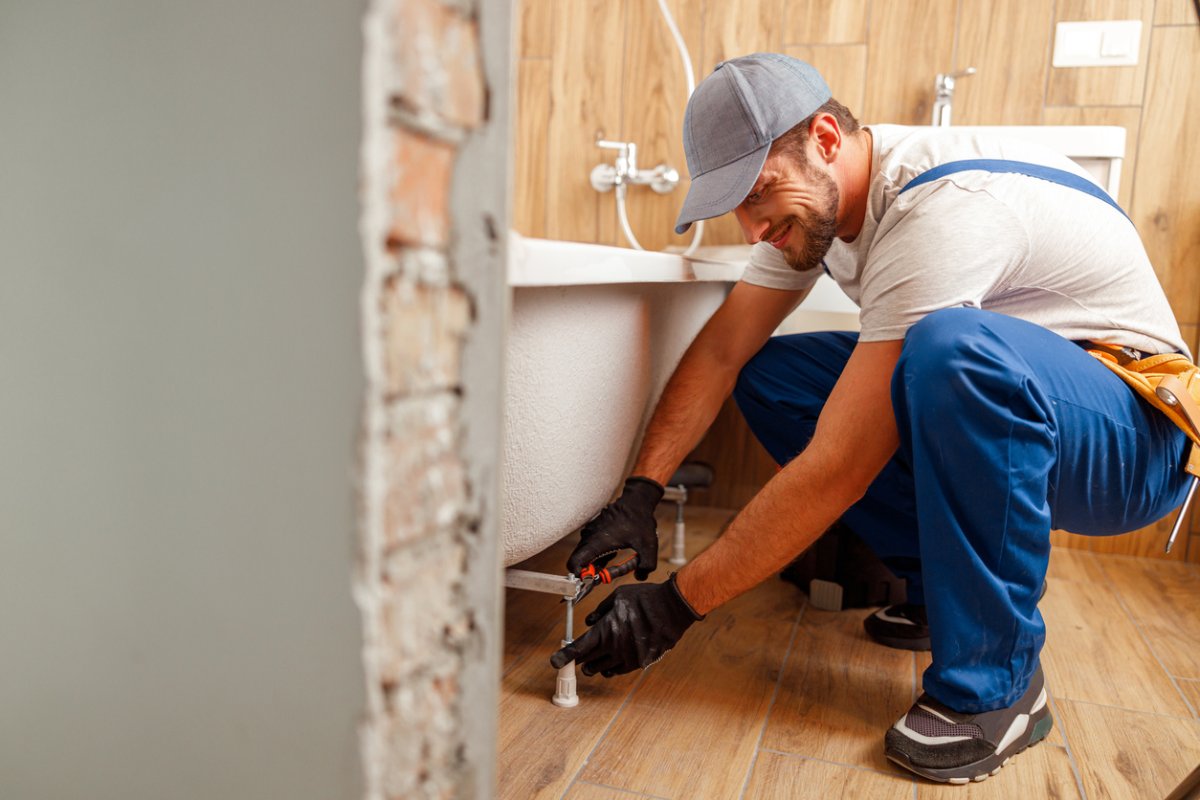

We may earn revenue from the products available on this page and participate in affiliate programs. Learn More ›
Highlights
- The typical cost range for a bathroom remodel is $6,624 to $16,922, with homeowners paying a national average of $11,533.
- There are numerous factors that can affect the total cost, including the size of the bathroom; the types of cabinetry, countertops, faucets, fixtures, and lighting chosen; and the cost of labor and installation.
- Homeowners will want to consider a bathroom remodel if their current bathroom has safety hazards, mold and mildew, too few storage options, or an outdated design.
- Homeowners may be able to handle some aspects of a bathroom remodel project on their own, but it’s often best to hire a professional for the job—especially if it entails working with electricity, plumbing, and HVAC.
Tired of aged, cracked tile and grout in a dated bathroom? A fresh remodel of the bathroom can be remarkably uplifting, and as a bonus, it can also increase the home’s value.
But how much is a bathroom remodel? According to Angi and HomeAdvisor, the average cost to remodel a bathroom is $11,533 but can range between $6,624 and $16,922. There are many variables in the average cost of a bathroom remodel; homeowners will want to familiarize themselves with these factors before starting this home project.
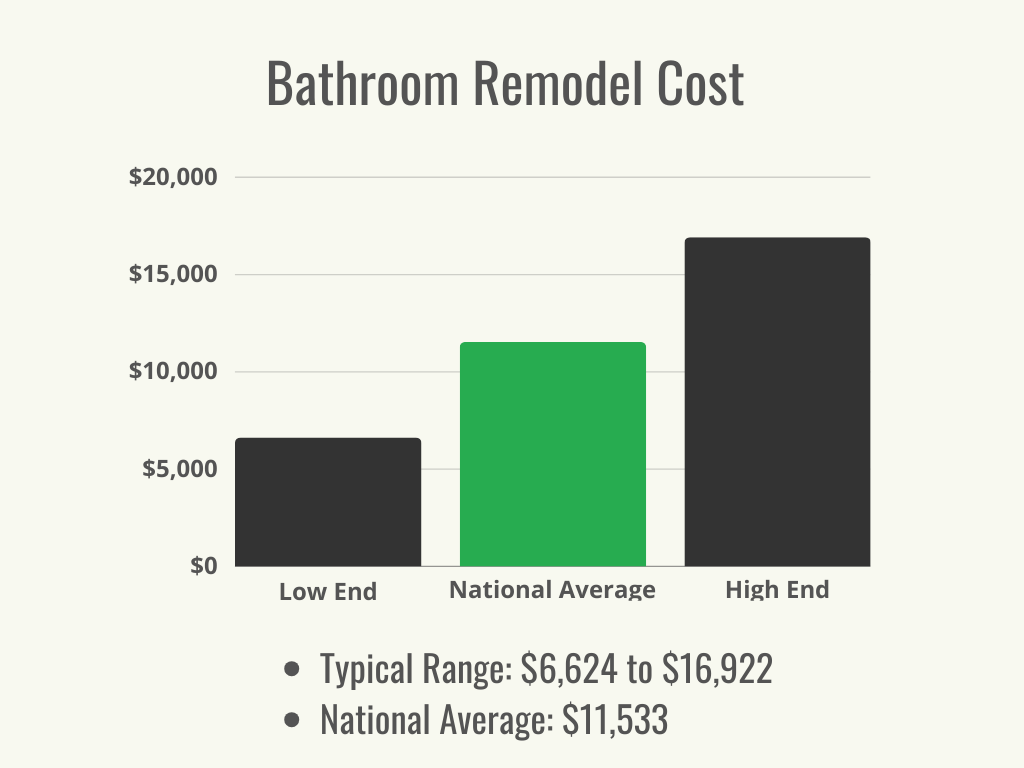
Bathroom Renovation vs. Bathroom Remodel
“Renovation” and “remodel” are words that are often casually substituted for one another, but in terms of actual planning and construction, they’re quite different. It’s key to know how to identify a project to get the best advice from the best bathroom remodel companies, contractors, and designers. There is some overlap, and even some bathroom remodeling services will use the words interchangeably, but there is a distinction. It’s worth noting that a renovation can creep into a remodel if problems or emergency repair needs are discovered in the process, so it’s wise to leave plenty of room in the budget even if all that is intended is a light renovation.
Renovating
Bathroom renovations work within an existing space and footprint, for the most part, to freshen, modernize, and functionally or cosmetically improve the space. According to Leah Tuttleman, an interior designer at Re-Bath, a nationwide bathroom remodeling company, “Renovating is all about making subtle refinements and freshening up the space without rearranging too many things.” In other words, if it already exists and is being changed out or cleaned up, that is renovating. Tuttleman also notes that bathroom renovation costs less “because you aren’t making major structural changes. It might involve replacing fixtures, tile, countertops, hardware, and paint, giving the space a new fresh look without altering the fundamental layout.”
Remodeling
Remodeling is a renovation plus construction. “Typically, remodeling involves a complete transformation of the space,” says Tuttleman. “You are making significant changes to the layout, design, and functionality of a bathroom. This usually includes changing the floor plan, moving plumbing, and taking it all back to the studs. You will have a clean slate to work with.” If the project involves tearing out a wall to reframe and expand the space, absorbing a nearby closet, it’s a remodel. Moving significant plumbing structures underneath the flooring to add additional sinks or moving a tub or shower to a different location are also remodels. These projects involve large-scale construction and structural changes to the space in addition to requiring significant electrical, plumbing, and building permits.
Key Cost Factors
One of the trickiest parts of assessing remodeling costs in any room is the loose interpretation of what constitutes a remodel. In addition, the variety of materials available and the wild diversity of the pricing of those materials make it hard to pin down what a reasonable budget looks like. These are the most important factors to consider while assessing what level of bathroom remodeling is in the budget.
Bathroom Size
Smaller bathrooms require less material and therefore are usually less costly to remodel—but because they are smaller spaces that require many cuts and trims of materials, sometimes they cost more than a homeowner might expect because of cut-off material waste. On average, a bathroom remodel costs between $70 and $250 per square foot. A 40-square-foot bathroom will cost anywhere from $2,800 to $10,000 to remodel, while a relatively palatial 10-foot by 10-foot bathroom can cost as much as $25,000 to remodel.
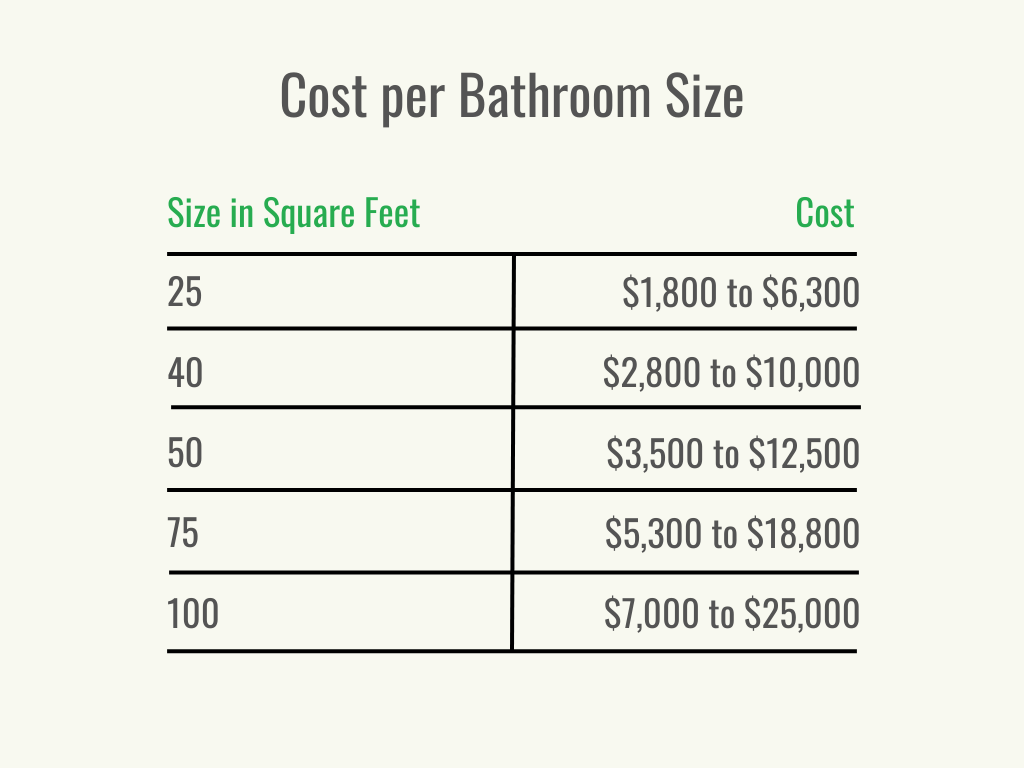
Project Scope
Many different elements make up a bathroom. Some of these features are essentials, such as sinks, toilets, countertops, and lighting; however, costs can vary greatly depending on the quality of these items. For example, the cost of countertops can range from $400 to $4,300 depending on whether a homeowner chooses acrylic, marble, or something in between.
According to Tuttleman, “Pricey bathroom elements such as artisan-crafted faucets, custom mosaic tiles, imported materials, and unique one-of-a-kind cabinetry add up very fast. High-end natural stone and unique materials for countertops are typically much more expensive than off-the-shelf options.” Homeowners will want to identify where they want to splurge on luxury or high-quality materials and where they can save.
| Project Element | Cost |
| Cabinets | $300 to $42,000 |
| Countertops | $400 to $4,300 |
| Doors | $360 to $1,200 |
| Faucets | $170 to $360 |
| Fixtures | $200 to $1,800 |
| Flooring | $2 to $22 per square foot |
| Lighting and ventilation | $150 to $930 |
| Shower | $200 to $15,000 |
| Sinks | $215 to $625 |
| Tile | $0.50 to $15 per square foot |
| Toilets | $375 |
| Tub | $4,200 to $11,000 |
| Windows | $280 to $6,400 |
Labor and Permits
On average, the labor cost to remodel a bathroom works out to $50 to $75 per hour, and it can make up between 40 percent and 65 percent of the budget. Homeowners can potentially save on the labor cost of replacing a toilet, painting the bathroom, or putting in new hardware by doing it themselves. But for more involved jobs, a contractor, plumber, and electrician may be necessary. It’s a good idea for homeowners to hire a general contractor for larger jobs, but it’s worth noting that they will charge about 10 percent to 20 percent of the total project cost. Hiring a plumber can cost $45 to $200 per hour depending on the job and the experience level of the plumber. Hiring an electrician costs $50 to $200 per hour.
State and local permit requirements vary, but as soon as electrical or plumbing changes are being made, it’s more likely that a permit will be required. These can cost between $100 and $1,000. A good general contractor will be able to help a homeowner sort through the permitting process.
Geographic Location
The average bathroom remodel costs $11,533, but as with any home renovation, the cost of materials and labor will vary based on location. As a rule, costs on the coasts are higher: the top of the average range in Los Angeles is $25,600, whereas the top of the range in Chicago is $13,600. There may not be a way to avoid some of this skewing, but shopping your market wisely and comparison shopping can help homeowners find the most economical way to get the bathroom they want.
| Location | Average Cost (Materials and Labor) |
| Atlanta | $7,000 to $18,000 |
| Boston | $6,800 to $15,600 |
| Chicago | $5,600 to $13,600 |
| Los Angeles | $12,000 to $25,600 |
| Miami | $5,500 to $13,600 |
| New York City | $7,000 to $16,000 |
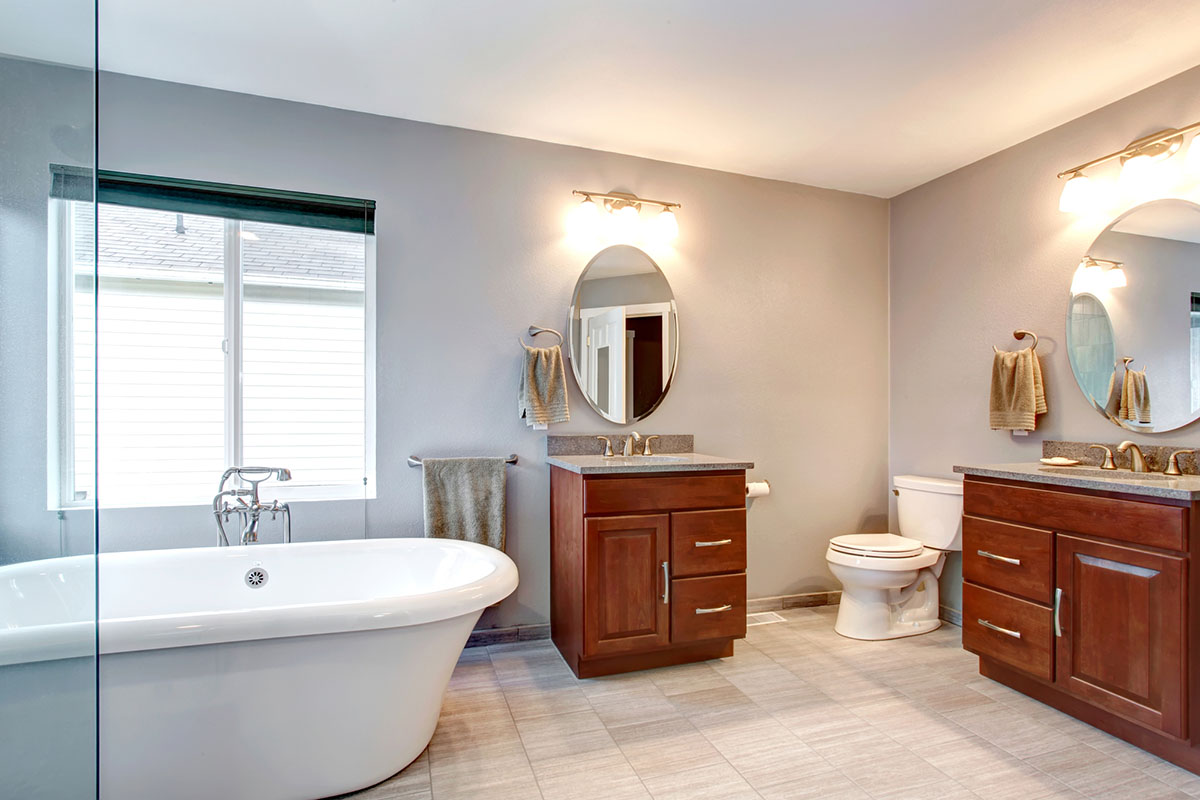
Additional Costs and Considerations
While material and labor costs make up the majority of remodeling expenses, there are some other aspects of the project to consider that may not appear on a bathroom remodel cost estimator. Some of these items are considered musts, while others will allow homeowners to customize the project and decide which elements are worth hunting down a bargain for and which are OK to settle on.
Electrical and Plumbing
There is a lot of plumbing and electrical in any bathroom, and all of it is tucked behind walls in damp areas, so unexpected corrosion or failure can be hidden. Toilet installation costs $375 on average, while a new outlet will run between $130 and $300 to install. However, if a homeowner discovers that the water heater that supplies the tub is corroded or leaking, that water heater replacement costs $874 to $1,765. A failed drain pipe, or an outlet that isn’t up to code and needs new wiring strung from the breaker, can cost significantly more than one might expect, so even if changing the plumbing or electrical systems isn’t in the plan, it’s best for homeowners to budget for emergencies. It’s a good idea to hire one of the best plumbing services (such as Mr. Rooter or Roto Rooter) for urgent plumbing repairs.
Water Damage Repair
Bathrooms are highly prone to water damage, but it can sometimes go unnoticed if leaks are located under flooring or inside walls. Water damage can lead to serious structural issues and mold growth, so once it is identified, it cannot be ignored. In most cases, repairing water damage costs $3.75 to $7 per square foot.
Floor Plan Changes or Expansion
Remodels that involve expanding or significantly changing the floor plan of a bathroom typically require a bit more planning and assistance from bathroom remodelers. It’ll be important for a homeowner to consider the costs of rerouting electrical wiring; insulation, transferring, and redrilling joists to accommodate rerouted plumbing; framing costs; and drywall costs. It may be worth a homeowner consulting an architect and a structural engineer. These professionals can cost an average of $100 to $200 per hour. Overall, the choice to expand or change the floor plan of the bathroom can add at least $5,000, and potentially much more, to the cost of bathroom remodeling.
Universal Design and Accessibility
Bathroom remodels that include features compliant with the Americans with Disabilities Act (ADA) may be necessary to accommodate aging or disabled family members. Wider door frames, lower cabinet heights, and zero-depth entry showers and tubs with grab bars are some of the most common accessibility features. Costs will vary based on the selected accommodations: A couple of grab bars will only cost $100 to $500, but a shower lift could cost as much as $1,500.
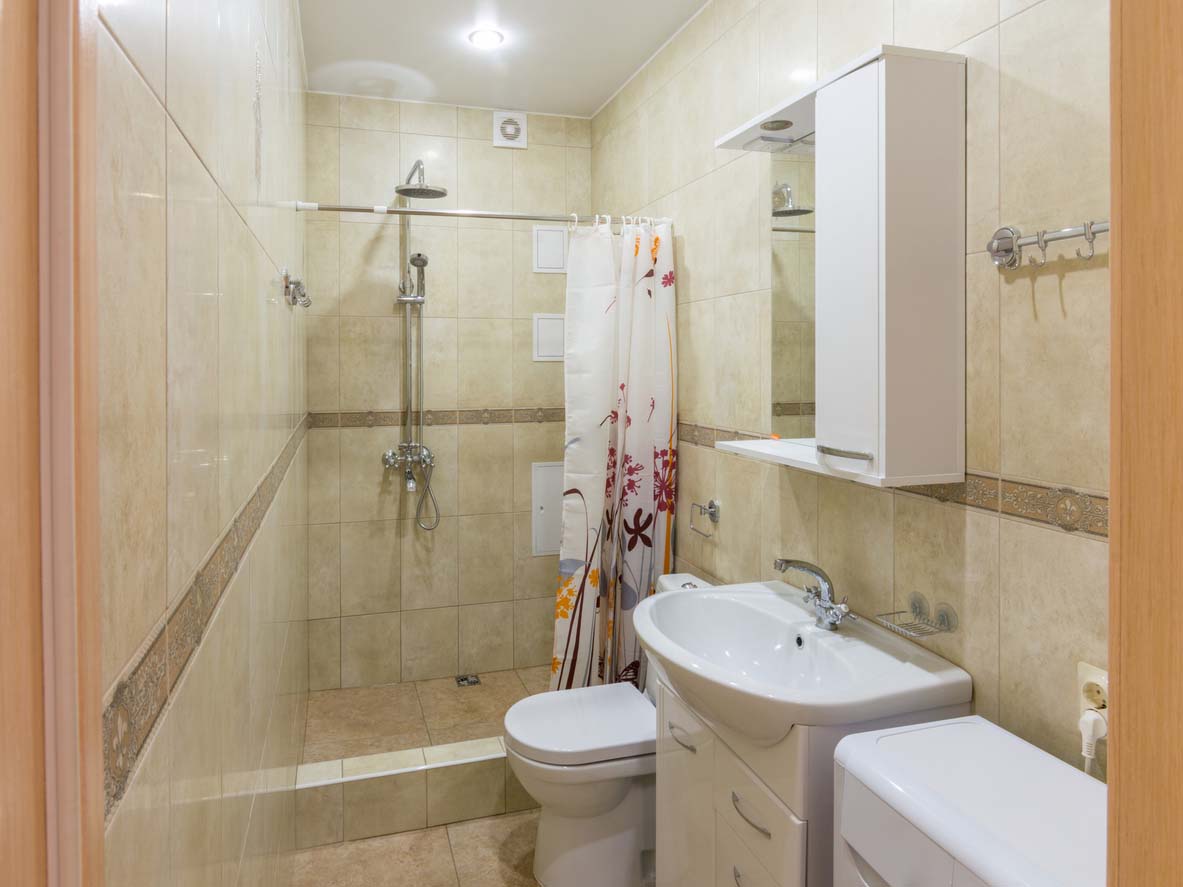
Cost by Type of Bathroom
Costs for remodeling a large primary bathroom will differ significantly from the cost to remodel a small powder room. A bathroom’s size and features will largely dictate what a homeowner pays for this remodel project.
| Bathroom Type | Average Cost (Materials and Labor |
| Full bathroom | $3,500 to $16,000 |
| Guest bathroom | $3,500 to $10,000 |
| Half-bath or powder room | $1,200 to $4,000 |
| High-end bathroom | $20,000 to $100,000 |
| Jack-and-Jill bathroom | $7,000 to $22,500 |
| Mobile home bathroom | $3,500 to $10,000 |
| Primary bathroom | $15,000 to $55,000 |
| Small bathroom | $2,500 to $6,000 |
| Wet room | $7,500 to $19,000 |
Full Bathroom
A full bathroom includes a toilet, sink, and shower or tub (or combination shower and tub). Most full bathrooms are at least 35 square feet, but they may be as large as 50 to 80 square feet. Homeowners can expect full bathroom remodel costs to be about $3,500 to $16,000.
Guest Bathroom
Like full bathrooms, guest bathrooms typically include a shower or tub in addition to a sink and toilet. However, they are typically smaller than a primary bathroom and are not connected to a bedroom. Due to their smaller size, guest bathroom remodeling costs about $3,500 to $10,000.
Half-Bath or Powder Room
Bathrooms that do not include a shower or tub are called half-baths. The terms “half-bath” and “powder room” are sometimes used interchangeably; however, powder rooms are often considered to be for guests and may therefore be located near the entrance of a home. Both types of bathrooms have a remodel cost range of about $1,200 to $4,000.
High-End Bathroom
High-end bathrooms are almost always located off the primary bedroom and may include luxury features, top-of-the-line materials, and custom finishes. A high-end bathroom remodel will require the largest financial investment and has a cost range of $20,000 to $100,000.
Jack-and-Jill Bathroom
A Jack-and-Jill bathroom is designed to be accessible from two adjacent bedrooms. Often, the shower and toilet are housed in separate parts of the bathroom with their own doors. Remodeling this style of bathroom can cost anywhere from $7,000 to $22,500.
Mobile Home Bathroom
Many mobile homes will have at least one full bathroom, and some also have an additional half-bathroom. Mobile home bathrooms are relatively small—about 35 to 50 square feet. On average, the cost to remodel a mobile home bathroom is between $3,500 and $10,000.
Primary Bathroom
A primary bathroom is usually located off the primary bedroom. Since this bathroom typically sees the most use, many homeowners like to splurge on some of their preferred features in this kind of remodel. Since primary bathrooms are also typically the largest bathrooms in the home, remodel costs can range from $15,000 to $55,000.
Small Bathroom
Small bathrooms are slightly larger than a half-bath and may contain a shower, but typically not a full bathtub. They may also have limited storage space. A Remodeling a small bathroom costs anywhere from $2,500 to $6,000.
Wet Room
Wet rooms are defined by being waterproof and having an open shower. Unlike most bathrooms, which have either a shower stall or a tub, there is no separation between the shower and the bathroom floor in a wet room. In smaller bathrooms, this can save space and make the room feel less cramped. However, wet rooms have a relatively high cost since all parts of the room must be made waterproof. Wet rooms can cost between $7,500 to $19,000.
Benefits of Choosing a Bathroom Remodel
A bathroom remodel may seem like an unnecessary expense if a bathroom is functional but simply old. However, there are many benefits to remodeling a bathroom even if it isn’t falling apart. Homeowners who have lots of exciting bathroom remodel ideas may be able to justify this project by considering the following.
Increased Home Value
A sleek, updated bathroom instantly increases the value of your home. Remodeling Magazine’s Cost vs. Value Report places the average return on investment on a quality bathroom remodel at about 66.7 percent, right behind replacing the windows or remodeling the kitchen. Beyond the measurable increase in value, the emotional benefit to a potential buyer seeing an intensely personal space as an oasis waiting for them in their new home is significant.
Improved Energy Efficiency
Older light fixtures and water heaters are most likely not up to today’s standards, and replacing them with newer models can make the home more energy efficient and save on electricity and gas bills. Along the same lines, low-flow toilets and shower heads preserve precious water with little perceptible change for the user, so a new bathroom can help homeowners help the environment.
Decreased Safety Hazards
Most bathrooms, especially older ones, contain many potential safety concerns. First, it’s a room with both water and electricity in close proximity, so a remodel offers the opportunity to install ground fault circuit interrupter (GFCI) outlets with auto-shutoff snaps to protect users from electrical shock. Smoothing out cracks or rolls in old tile floors and replacing slippery flooring with textured materials can reduce slipping, as can selecting a bathtub or shower with integrated slip-resistant materials.
Modernized Design
Bathrooms feel dated quickly, which is one of the reasons bathroom remodels are one of the most popular renovation projects in America. In addition, modern fixtures provide hygienic and convenience options that were simply not available to earlier remodelers. A modern bathroom remodel doesn’t have to make the space look sleek and cold, but it can be luxurious and relaxing. Homeowners can look at bathroom remodel pictures online for inspiration.
Mold and Mildew Removal
The mold and mildew that can develop behind tile or drywall, in grout or tile seams, and on ceilings can at best cause minor allergic irritation and at worst cause major respiratory ailments. Remodeling provides a chance to test for mold, clear out any existing mold and mildew, and start fresh with clean surfaces and new sealants (and budget for the cost to install a bathroom fan to remove moisture if one does not already exist). Many of the products used in bathroom remodels have mold- and mildew-resistant properties, which will help stave off major issues for years.
Storage Expansion
If a bathroom has always felt a little hemmed in and there’s a closet or extra bedroom adjacent, a carefully planned remodel can open up the options to make the space larger or build out a linen or supply closet. Even if there isn’t available expansion space, there’s unexpected space in many bathrooms for between-the-studs cabinets that can be neatly built into the wall and can run from floor to ceiling, providing additional storage space.
DIY vs. Hiring a Professional
Many homeowners find themselves faced with a choice between doing a DIY bathroom remodel or hiring a professional. “Homeowners can often tackle some aspects of a bathroom remodel themselves,” says Tuttleman. “Consider doing the demo yourself. If you are handy with a paintbrush and a roller, that might be a great way to take on that task and reduce that expense. Consider minor updates such as changing hardware and bathroom accessories yourself.”
However, it’s important to remember that bathrooms are a crossroads of many major systems, including electrical, plumbing, and HVAC. “Structural changes, such as moving walls or plumbing, are best left to the professionals for code and safety reasons. It’s important to know your abilities and limitations,” Tuttleman adds. Homeowners who opt for a DIY bathroom remodel will want to be particularly cautious about unusual smells or sounds coming from pipes and wiring and need to pay attention to concerns such as asbestos, lead paint, and radon gas when dealing with open pipes.
It’s a good idea to hire an experienced general contractor who can help plan the project, avoid common bathroom remodel mistakes, and manage subcontractors such as plumbers and electricians. In addition, professionals will be insured, so if a project takes a wrong turn, they can handle it and will then be covered for any damage done to the home. Finally, some higher-end suppliers won’t sell materials to the general public and require a contractor’s membership or license number before they’ll provide prices or permit sales.
How to Save Money
Because there are so many components in the cost of bathroom remodel, there are a lot of areas to potentially save. Some items will be nonnegotiable, such as the cost of permits or some materials, but there are plenty of ways for homeowners to realize their bathroom remodel ideas on a budget.
- Have a clear plan. Understanding how the project will unfold will make for a smoother remodeling process and reduce the likelihood of costly mistakes. It’s also a good idea to include a contingency budget to cover unexpected surprises.
- Hire a contractor, a designer, or both. Hiring a professional who is an expert on how to remodel a bathroom will add cost to the overall budget, but they may help save money in the long run by providing discounts on materials and preventing costly mistakes.
- Keep the existing layout and plumbing. By not changing the footprint of the room or moving the plumbing access, homeowners can save thousands of dollars.
- Refinish, don’t replace. Modern sink and bathtub refinishing costs less than replacement and lasts for years.
- Check out alternative sources for materials. Upcycling a dresser or sideboard from a vintage or salvage shop can make a great vanity with a little work, as can leftover kitchen cabinets. Online remnant shops and neighborhood online sale sites can be a great option for accent or flooring tile—someone else’s leftovers can turn into an affordable upgrade to the remodel plan.
- Let paint do some of the decorating work for you. Colorful choices of paint and accent pieces can make an enormous impact alongside simple, inexpensive tile or beadboard for much less.
- Try DIY. Homeowners can ask their contractor what work they can do themselves to shave some labor time off the final tally. Some demolition, painting, and installations may be something homeowners can handle on their own.
If paying for a bathroom remodel out of pocket isn’t feasible, a homeowner may want to consider financing the project using one of the best home equity loans from providers such as U.S. Bank or Flagstar Bank.
Questions to Ask a Pro
Bathroom remodels are complicated because of all of the home systems and decor elements involved. According to Tuttleman, “A bathroom remodel contractor should be interviewed. Check their credentials, and ask for at least three references with similar-sized projects that were recently completed. I suggest checking online reviews as well.” There are several important questions for homeowners to ask while deciding who to hire for a bathroom remodel.
- What kind of experience do you have specifically with bathroom remodels?
- Are you licensed and insured?
- How many projects do you take on at one time?
- Will you provide options and recommendations for a variety of brands and materials, or are you committed to particular choices?
- What is your anticipated timeline for completing the project?
- How do you choose your subcontractors? If I have a plumber I’ve worked with in the past and would prefer to use them, will that be acceptable?
- What permits will be required?
- Will you provide a written estimate and warranty for the work?
- Can you provide photographs of work you’ve done and the contact information for local references?
FAQs
With so many choices, so many decisions, and so many unknowns, the process of beginning a bathroom remodel can be overwhelming. Choosing a good contractor and envisioning the ideal space are great first steps. These are answers to some of the most common questions homeowners have about bathroom remodels.
While a small bathroom seems like it should cost much less to remodel than a large one, there can be complications: Small spaces and odd angles can create a lot of wasted material and sometimes require nonstandard or custom fixtures, which are more expensive than standard. The cost to remodel a small bathroom is about $3,125 to $6,000, but the job can be completed for as inexpensively as $2,500.
Yes, if a homeowner is willing to roll up their sleeves and make some tough choices. A small bathroom, roughly 5 feet by 8 feet, can be remodeled for $5,000 given a couple of conditions. It’ll still be necessary to hire a contractor, and it’ll be necessary to choose or find budget bathroom remodel materials. Without incredible luck on the remainder or leftover market, this won’t be a job that features expensive, exclusive tile. But homeowners can achieve a cheap bathroom remodel that results in a clean, fresh space for $5,000.
Anything that involves moving the plumbing, especially the main waste line, will push the cost of a bathroom remodel through the roof. Moving the waste line means pulling up the flooring and sometimes part of the wall, paying a plumber for hours of work, and connecting new fixtures. If the plumbing is left in place, the cost of installing a bathroom vanity, surprisingly, will often become the largest expense. Consider all options in terms of shopping sales and clearance items, along with resale shops or salvage stores, to take the cost down on a replacement vanity.
A professional can likely complete a small bathroom renovation in around 2 weeks. Homeowners who choose to DIY this project may take more like 5 weeks to renovate a small bathroom. The exact time will depend on the extent of the renovation.
There are several features that can potentially add value to a bathroom:
1. Refinishing the bathtub
2. Replacing the bathroom cabinets
3. Adding a walk-in shower
4. Installing new flooring
5. Updating the bathroom vanity
Angi, HomeAdvisor, Fixr
